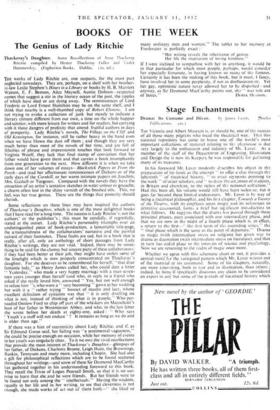BOOKS OF THE WEEK
The Genius of Lady Ritchie
THE works of Lady Ritchie are, one suspects, for the most part neglected nowadays. They are, perhaps, on a shelf with her brother- in-law Leslie Stephen's Hours in a Library or books by H. B. Marriott Watson, E. F. Benson, Alice Meynell, Austin Dobson—respected names that suggest a stir in the literary ocean of the past, the ripples of which have died or are dying away. The reminiscences of Lord Frederic or Lord Ernest Hamilton may be on the same shelf, and I think that nearby is a well-thumbed copy of Robert Elstnere. I am not trying to evoke a collection of junk but merely to indicate a literary climate different from our own, a time on the whole happier and sunnier, with more leisure for writers and for readers, but carrying with it those dangers of prolixity that attend fruitful authors in days of prosperity. Lady Ritchie's novels, The Village on the Chif and Old Kensington, for instance, still lie rather heavy in the hand even when we have blown the dust off them ; and though they are very much better than most of the novels of her time, and are full of felicities of phrase and impressionist touches that look forward to Virginia Woolf, they lack that final stamp of conviction that her father would have given them and that carries a book triumphantly from one generation to the next. How different it is when we take down one of her volumes of essays—Blackstick Papers or Front the Porch—and read her affectionate reminiscences of Dickens or of the early days of the Cornhill, or her warm intimate papers on Joachim, Mrs. Gaskell or Turgenev. Compared with the novels they have the attraction of an artist's tentative sketches in water-colour or gouache, a charm often lost in the shiny varnish of the finished oils. This, we feel, was her true genius. These are the things that posterity should chet ish.
Some reflections on these lines may have inspired the authors of Thackeray's Daughter, which is one of the most delighttul books that I have read for a long time. The success is Lady Ritchie's, not the authors' or the publisher's ; this must be candidly, if regretfully, stated at the outset. Lady Ritchie's personality triumphs over an undistinguished piece of book-production, a lamentable title-page, the amateurishness of the collaborators' narrative and the painful naiveté of their footnotes. These faults are sad, but in a book that is really, after all, only an anthology of short passages from Lady Ritchie's writings, they are not vital. ' Indeed, there may be some- thing to be said for the clumsy but sincere piety of these collaborators: if they had been. better at their job, they might have stolen some of the limelight which is now properly concentrated on Thackeray's daughter. For she deserves to be remembered for herself, that dear fantastic lady,!' as Henry James called her, who could date a letter "Yesterday," who made a very happy marriage with a man seven- teen years younger than herself (and who, in reply to a friend who asked if she really loved him, answered " Yes, but not well enough to refuse him "), who wore a" very becoming "gown at her wedding but with it a "'rather trying " bonnet of muslin and lace, whose excellent definition of cynicism was that " it is only dwelling on what is not, instead of thinking of what is in people," Who per- suaded Onslow Ford to chip off part of the whiskers on Marochetti's bust of her father in Westminster Abbey, and who, in the last letter she wrote before her death at eighty-one, asked : " Who says
Youth's a stuff will not endure ' ? It remains as long as we do and is older than age."
If there was a hint of eccentricity about Lady Ritchie, and if, as Sir Edmund Gosse said, her failing was "a sentimental vagueness," she could be precise enough on occasion, while her memory of events in her youth was singularly clear. To it we owe the vivid recollections that provide the maid interest of Thackeray's Daughter—glimpses of her father, of Dickens, Charlotte Bronte, Leigh Hunt, the Brownings, Ruskin, Tennyson and many more, including Chopin. She had also a gift for philosophical reflections which are to be found scattered throughout her writings—and some of these Sir Desmond MacCarthy has gathered together in his understanding foreword to this book. They recall the Trivia of Logan Pearsall Smith, so that it is no sur- prise to learn that she And he were friends. But her friends were to be found not only among the" intellectuals." Having the wisdom, equally in her life and in her writing, to see that cleverness is not enough, she made works of att out of them both—" she liked so many ordinary men and women." The tablet to her -memory at Freshwater is perfectly exact : - "Her writing reveals the inheritance of genius. Her life the inspiration of loving kindness."
If I were inclined to sympathise with her in anything, it would be in that particular for which most people, perhaps, would consider her especially fortunate, in having known so many of the famous. Certainly it has been the making of this book, but it must, I fancy, have involved her in some perplexity, if not in disillusionm mt. Yet her gay, optimistic nature never allowed her to be dispirited—and anyway, as Sir Desmond MacCarthy points out, she " was tole. ant of bores." DLREK HUDSON.


































 Previous page
Previous page